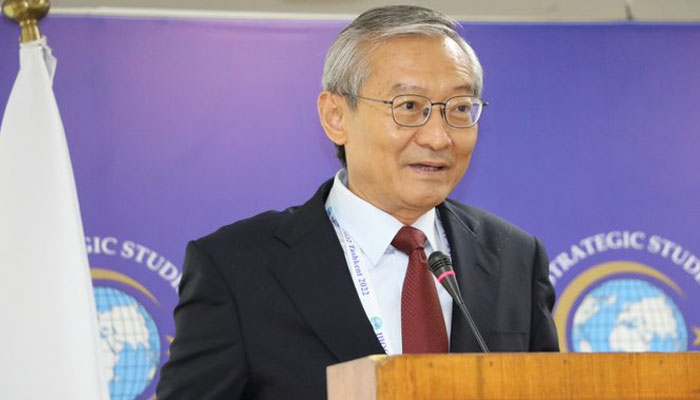Shorter sea access: Pakistan ideally located for landlocked SCO members, says Zhang Ming
Zhang Ming said the connectivity would facilitate trade among the SCO member states and even beyond
ISLAMABAD: Shanghai Cooperation Organisation (SCO) Secretary General Zhang Ming has said Pakistan is ideally located for providing the land-locked SCO members with a shorter sea access.
Delivering a speech here on Friday at the Institute of Strategic Studies (ISS) during his four-day visit to Pakistan, he said the connectivity would facilitate trade among the SCO member states and even beyond. He said the transport corridors stood to benefit all SCO members, leading to a win-win situation.
He talked about the structure, functions and history of the SCO in detail. Shedding light on the difference among the member states, he said the organisation was established on the guiding principles of the Shanghai Spirit. Although, it started as a regional security organisation, it expanded its functioning later to the economy, politics and people-to-people contacts. The SCO was expanding. It started with the inclusion of Pakistan and India as its permanent members. Iran applied for full membership and after fulfilling the criteria for the membership, it would be granted permanent member status eventually. He said the SCO family now comprised 21 members.
He said that since its inception, the SCO had been contributing to enhancing cooperation among the member states, particularly in the area of economic development. He emphasised that the SCO functioned upon consensus-based principle, equally empowering all the members.
He said the SCO was established 20 years ago when the context and needs of the time were different. Now many geopolitical and geo-economic changes were taking place in the international arena. Therefore, the SCO should adapt accordingly for its functional efficiency, he concluded.
Earlier, Dr Talat Shabbir from the ISS presented the address of welcome. Khalid Mahmood, chairperson, BoG, ISS, also spoke on the occasion. Meanwhile, Foreign Minister Bilawal Bhutto Zardari Friday highlighted the importance of regular exchanges with Iran to advance economic and trade relations, energy cooperation, regional security and connectivity.
During a meeting with Iran’s Special Representative to the President on Afghanistan Hassan Kazemi Ghomi, Bilawal reaffirmed Pakistan’s commitment to a peaceful, stable, prosperous and connected Afghanistan.
According to a statement issued by the Foreign Office, Bilawal underscored the importance of close cooperation between Pakistan and Iran on matters relating to Afghanistan, including refugee management, regional security, and institutional mechanisms.
The foreign minister highlighted Pakistan’s provision of humanitarian assistance to Afghanistan, including recent relief efforts in the wake of the devastating earthquake in eastern Afghanistan on June 22. He also reiterated the importance of continued constructive engagement and practical cooperation with the interim Afghan government in order to promote the objective of sustainable peace and security in the region.
On bilateral ties, the foreign minister expressed Pakistan’s keen desire to strengthen relations with Iran, which are rooted deep in common faith, shared history, and cultural affinities. Iran’s special envoy noted that Iran associated great importance to its relations with Pakistan. He appreciated the constructive role played by Pakistan in Afghanistan and underscored that peace and stability in Afghanistan were essential pre-requisites for the region’s long-term stability and prosperity.
Earlier, the Iranian Special Representative met his Pakistani counterpart, Ambassador Mohammad Sadiq, where both sides discussed the evolving situation in Afghanistan, highlighted the importance of pursuing continuous and practical engagement and reviewed various trade and connectivity initiatives in the region.
-
 It's A Boy! Luke Combs, Wife Nicole Welcome Third Child
It's A Boy! Luke Combs, Wife Nicole Welcome Third Child -
 Leading Astrophysicist Shot Dead At Southern California Home
Leading Astrophysicist Shot Dead At Southern California Home -
 Johnny Depp's Kind Gesture Towards Late 'Grey's Anatomy' Actor Eric Dane Before Death Laid Bare
Johnny Depp's Kind Gesture Towards Late 'Grey's Anatomy' Actor Eric Dane Before Death Laid Bare -
 How Princess Eugenie, Beatrice React To Andrew Arrest?
How Princess Eugenie, Beatrice React To Andrew Arrest? -
 Kylie Jenner 'convinced' Gwyneth Paltrow Is 'crushing' On Timothee Chalamet: 'It's Disrespectful'
Kylie Jenner 'convinced' Gwyneth Paltrow Is 'crushing' On Timothee Chalamet: 'It's Disrespectful' -
 Jemma Chan Reflects On 'difficult Subject Matter' Portrayed In 'Josephine'
Jemma Chan Reflects On 'difficult Subject Matter' Portrayed In 'Josephine' -
 Blood Falls In Antarctica? What Causes The Mysterious Red Waterfall Hidden In Ice
Blood Falls In Antarctica? What Causes The Mysterious Red Waterfall Hidden In Ice -
 AI Power Play: Nvidia Moves To Invest $30 Billion In OpenAI
AI Power Play: Nvidia Moves To Invest $30 Billion In OpenAI -
 Will Savannah Guthrie Ever Return To 'Today' Show? Here's What Insiders Predict
Will Savannah Guthrie Ever Return To 'Today' Show? Here's What Insiders Predict -
 Andrew Mountbatten-Windsor In A Fix Over New Disturbing TMZ Photos
Andrew Mountbatten-Windsor In A Fix Over New Disturbing TMZ Photos -
 Eric Dane Opened Up About Releasing His Memoir Just Two Months Before His Death Due To ALS Complications
Eric Dane Opened Up About Releasing His Memoir Just Two Months Before His Death Due To ALS Complications -
 Zendaya, Tom Holland Already Married? Actress Shows Off New Ring
Zendaya, Tom Holland Already Married? Actress Shows Off New Ring -
 King Charles Holds Emergency Meeting After Andrew Arrest: 'Abdication Is Not Happening'
King Charles Holds Emergency Meeting After Andrew Arrest: 'Abdication Is Not Happening' -
 Amazon Can Be Sued Over Sodium Nitrite Suicide Cases, US Court Rules
Amazon Can Be Sued Over Sodium Nitrite Suicide Cases, US Court Rules -
 'Vikings' Star Mourns Eric Dane's Death
'Vikings' Star Mourns Eric Dane's Death -
 Patrick Dempsey Reveals Eric Dane's Condition In Final Days Before Death
Patrick Dempsey Reveals Eric Dane's Condition In Final Days Before Death




